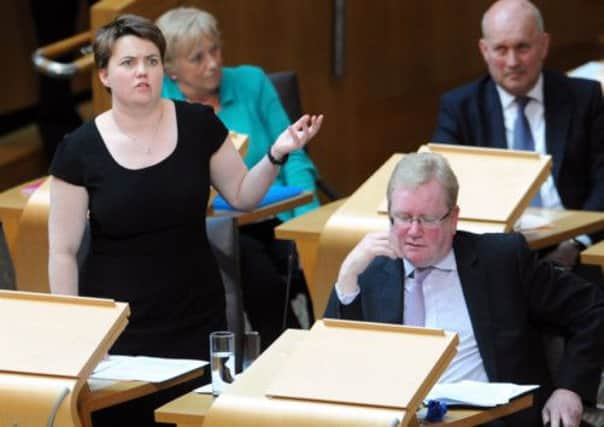Thatcher: Parties clash in Holyrood debate


On the day after the former Conservative prime minister was remembered at a funeral service in London, the Scottish Parliament considered the impact of her policies in a debate that attracted fewer than one-third of Holyrood’s 129 MSPs.
No members of Alex Salmond’s Cabinet spoke while Labour leader Johann Lamont and her front-bench team also stayed away.
Advertisement
Hide AdAdvertisement
Hide AdThe debate, called by the Greens and independent MSPs, had been scheduled for the day of the funeral on Wednesday, but was delayed amid concerns that it would have been seen as disrespectful.
Green MSP Patrick Harvie told the chamber that reaction toher death “predictably divided between hero worship on one hand and demonisation on the other”.
Mr Harvie highlighted the “relentless attention to individualism” under her government, resulting in the “exclusion of every collective solution to problems”.
He also hit out at her privatisation of public assets and her “market fundamentalism”.
Even “the record of the Thatcherite economic model fails”, he said.
“This was a government which enjoyed a windfall boost to the economy of some £70 billion from North Sea oil and a fire sale of public assets from major industries to the housing stock. They didn’t so much flog off the family silver as flog off the family home and then rent it back.”
Labour’s James Kelly branded the UK’s first, and so far only, woman prime minister a “class warrior” whose policies resulted in some people having “died in an early grave”.
Mr Kelly, Labour’s chief whip, said her policies saw “the destruction of manufacturing industry”. He said: “Back in the 1980s, the Conservative Party pursued policies which broke people’s hearts and destroyed their dignity.
Advertisement
Hide AdAdvertisement
Hide Ad“As politicians, we must resolve that that must never be allowed to happen again.”
But Conservative MSP Alex Johnstone said Mrs Thatcher was elected in 1979 “as a result of an experience in the 1970s that had broken this country”.
He told Mr Kelly: “The behaviour of the unions in particular in the United Kingdom had made the election of Margaret Thatcher an inevitability.”
Fellow Conservative MSP Mary Scanlon also defended the former leader, saying former Labour prime minister Harold Wilson “closed over 100 more mines than Mrs Thatcher did during her reign”.
Mr Kelly began by offering condolences “to those members of the Conservative family who have suffered a loss of someone who for them was a revered past leader”.
He went on to recall what Mrs Thatcher said on the steps of Downing Street in 1979, just after she was first elected PM.
“Margaret Thatcher declared on that day ‘Where there is discord may we bring harmony’. That declaration rung hollow in Cambuslang, where I grew up, because there was much disharmony when the local steelworks closed and many were heaped on to the scrapheap.”
Under Mrs Thatcher, “the reality was factories closed. We were told there wasn’t an alternative” and “dole queues lengthened”.
Advertisement
Hide AdAdvertisement
Hide AdScottish Conservative leader Ruth Davidson said Mrs Thatcher, later appointed a Baroness, helped sort out a mess created by Labour and militant unions in the 1970s.
Ms Davidson said Britain was “hopelessly uncompetitive” and offered goods of such poor quality that the Soviet Union was reluctant to buy.
“With the dead left unburied, rubbish piling up in the streets, union militants standing guard outside hospitals deciding which patients could be admitted – it was clear that Labour’s failure was costing Britain dear,” she said.
“This was clearly recognised by the SNP who supported Margaret Thatcher’s motion of no confidence in the government which led to the election and propelled her into power.”
The SNP government’s minister for local councils, Derek MacKay, used the debate to argue for independence.
Mr MacKay said Scotland “could have more opportunities to build a fairer society” if it left the “straitjacket” of the United Kingdom.
“UK cuts are biting hard but this country could do so much more with access to our own resources.”
He concluded: “With a Yes vote, there will be nothing to stop us building the society we seek.”